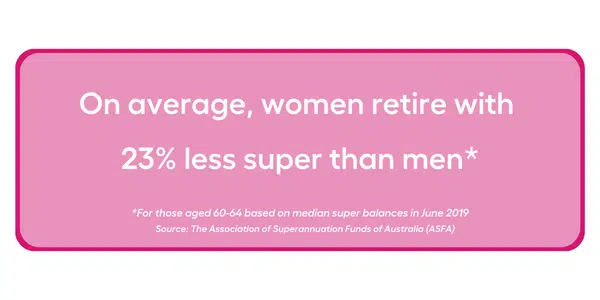Are you a woman wanting to retire early? Or a busy mum who’s taking some time off to look after your children and putting your super contributions on the back burner? Are you years away from your retirement and haven’t thought about how much you’re saving for it? If so, you’re not alone! Here are some valuable tips to boost your super to help you get ahead with your super today and be confident about your financial future.
If you’re someone who isn’t even thinking about retirement yet and just focusing on the now, that’s completely understandable. But, when it comes to your super, the best way to ensure you’re going to achieve have a comfortable retirement, is to plan ahead and take advantage of the super incentives that Australians have available to them! We’re going to share these below – so keep reading.
Despite the government making some recent changes to the superannuation system, they are yet to introduce initiatives that will have measurable impacts on reducing the gap in super balances between men and women.

Did you know that, on average, women retire with 23% less super than men?
That’s a pretty big difference! A few things contribute to this, like the gender pay gap – women earning less than men and women traditionally being the parent that takes time off to raise kids.
Plus, women often retire earlier than men but live longer, so they have less time to build up their superannuation balances but require them to last longer. This leaves many women having to rely on the age pension or other types of financial support in retirement.
If you are wanting to get ahead with your super today and be confident about your financial future, here are four tips to help.
Tips to boost your superannuation for women
1. Make concessional super contributions part of your budget
Did you know that you can make pre-tax contributions to your superannuation account?
These are called concessional contributions, and they can be a great way to grow your superannuation balance. The maximum amount of concessional contributions you can make each financial year is $27,500 (as of the 2021-2022 financial year onwards).
A common way to make concessional contributions into your super is through a salary sacrifice arrangement with your employer.
By making these contributions a regular part of your budget, you can:
- Increase your superannuation balance
- Reduce your taxable income
2. Consider spouse super contributions
If one spouse in the marriage is earning a low income or not working at all, the higher-earning spouse may be able to make non-concessional superannuation contributions on their behalf. These are called spouse super contributions, and they can be a tax-effective way to boost your overall superannuation balance.
You can receive a tax offset of up to $540 for contributions up to $3,000 per financial year. If you give less than $3,000 or your partner earns between $37,000 and $40,000 per year, you may still get a tax benefit, but smaller.
This may be a great way to help your spouse build their superannuation balance while also reducing your own taxable income.
3. Consolidate your super if you have multiple accounts
Do you have multiple super accounts?
If you’ve had multiple jobs over the years, it’s likely that you have multiple superannuation accounts. Consolidating them can help you to save on fees and make it easier to keep track of your super balance. You can do this by contacting your superannuation fund or using the Australian Taxation Office’s MyGov website.
However, it’s important to do your due diligence before consolidating to ensure that you don’t lose any insurance coverage or benefits that you currently have.
Want to learn more? Check out this guide: ‘Find My Super’.
4. Choose how you want your super invested
When it comes to your superannuation, you may want to review your investment options regularly. This can help you ensure that your investments are aligned with your long-term financial goals and your risk tolerance.
Most superannuation funds offer a range of investment options from conservative to high growth and some even provide you with ethical investment options to align more with your values.
When you’re selecting an investment option, you may need to consider:
- when you’re wanting to retire – how many years away
- how much risk you’re comfortable taking
- when you are wanting to access your super
Growth: A high-growth investment option is typically chosen by younger people as their retirement is in the distant future. The longer time frame reduces the impact of the short-term market volatility – allowing you to take more risks to gain higher returns in the long term.
Conservative: If you choose a conservative investment option, you may be wanting to retire soon and mitigate your risk of loss, so you’re happy to take lower returns over the long term.
Balanced: A balanced investment option aims to provide you with steady returns by choosing a balance between growth and conservative investment options. Balanced investment options carry a higher risk than conservative portfolios but less risk than growth portfolios.
You may want to check your Super fund to see what options are available to you and choose how you’d like your savings invested to ensure it is aligned with your retirement timeframe and risk tolerance.
If it’s the first time you’ve thought of boosting your Super, that’s okay! It’s never too late to get started and secure your financial future.
Seeking the professional advice of a financial adviser could also help you to make informed decisions about your super. If you’d like to boost your super today and live a richer life sooner, the team at My Money Sorted can help get you started by booking a free call here.
Disclaimer: The information (including taxation) contained in this article is general in nature and does not consider your individual circumstances or needs. Before acting on this information you should consider its appropriateness, having regard to your own objectives, financial situation and needs. You should read the relevant Product Disclosure Statements and seek personal advice from a qualified financial adviser.












